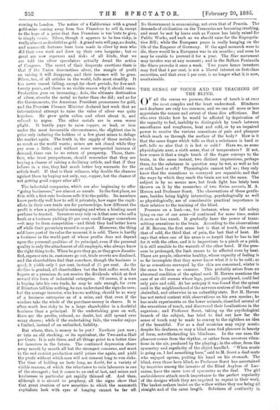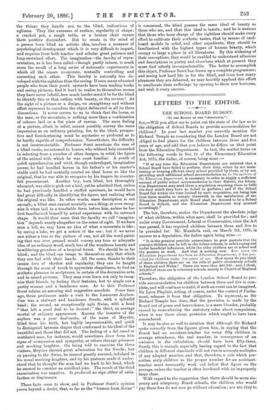THE SENSE OF TOUCH AND THE TEACHING OF THE BLIND.
OF all the senses we possess, the sense of touch is at once the most complex and the least understood. Blindness and deafness are only too common, and we can all more or less appreciate the nature and extent of these dire afflictions. But who ever thinks how he would be affected by deprivation of the capacity to feel, inability to distinguish by touch between smoothness and roughness, heat and cold, or by an impaired power to receive the various sensations of pain and pleasure which reach us through the surface of the body ? How is it that the same finger which tells us that a substance is hard or soft, tells us also that it is hot or cold Have we, as some physiologists aver, a sixth sense, that of temperature? If not, how comes it that a single touch of the finger conveys to the brain, in the same instant, two distinct impressions, perhaps three, for the substance in question may be wet, as well as hot or cold, hard or soft ? Physiologists cannot tell us ; they only know that the sensations so conveyed are separable, and that the ways by which they reach the brain are not the same. The subject is by no means new, but fresh light has lately been thrown on it by the researches of two Swiss savants, M. A. Herzen and Professor Soret. The observations of these gentle- men, besides being highly interesting, psychologically as well as physiologically, are of considerable practical importance in their relation to the training of the blind.
Pressure on a limb—as, for instance, when we fall asleep lying on one of our arms—if continued for some time, makes it more or less numb. It gradually loses the power of trans- mitting sensations to the brain. According to the observations of M. Herzen, the first sense lost is that of touch, the second that of cold, the third that of pain, the last that of heat. He says that when one of his arms is so torpid that he has to feel for it with the other, and it is impervious to a pinch or a prick, it is still sensible to the warmth of the other hand. If the pres- sure be prolonged, the limb ceases to be affected even by heat. There are people, otherwise healthy, whose capacity of feeling is so far incomplete that they never know what it is to be cold ; so far as sensations conveyed by the skin are concerned, winter is the same to them as summer. This probably arises from an abnormal condition of the spinal cord. M. Herzen mentions the case of an old woman whose legs, partially paralysed, could feel only pain and cold. At her autopsy it was found that the spinal cord in the neighbourhood of the nervous centres of the back was shrivelled, and otherwise in an unhealthy state. But M. Herzen has not rested content with observations on his own species ; he has made experiments on the lower animals, classified several of the sensations of touch, and discovered their localisations in the organism ; and Professor Soret, taking up the psychological branch of the subject, has tried to find out how far the sense of touch may be made to convey to the sightless an idea of the beautiful. For as a deaf musician may enjoy music, despite his deafness, so may a blind man find pleasure in beauty of form, notwithstanding his blindness. In the one case, the pleasure comes from the rhythm, or rather from sonorous vibra- tions in the air, produced by the playing ; in the other, from the symmetry and regularity of the object handle& "When music is going on, I feel something here," said to M. Soret a deaf-mute who enjoyed operas, putting his hand on his stomach. The blind, even those born blind, as Professor Soret has ascertained by inquiries among the inmates of the Blind Asylum of Lau- sanne, have the same love of symmetry as the deaf. The girl embroiderers attach much importance to the perfect regularity of the designs which they are required to repeat in their work. The basket-makers insist on the willow withes they use being all straight and of the same length. Solutions of continuity in the things they handle are, to the blind, indications of ugliness. They like evenness of surface, regularity of shape; a cracked pot, a rough table, or a broken chair causes them positive discomfort. But to create in the mind of a person born blind an artistic idea, involves a measure of psychological development which it is very difficult to impart, and requires from both teacher and scholar great patience and long-sustained effort. The imagination—the faculty of repre- sentation, as it has been called—though partly inborn, is much more the result of a long series of automatic experiments in which all the senses co-operate, mutually controlling and correcting each other. This faculty is naturally less de- veloped with the sightless than the seeing. If even many educated people who from their youth upwards have been reading books and seeing pictures, find it hard to realise to themselves scenes they have never beheld, how much harder must it be for the blind to identify this or that outline with beauty, or the reverse ! At the sight of a picture or a design, we straightway and without effort represent to ourselves the object delineated in all its three dimensions. It never occurs to us to think that the horse, or the man, or the mountain, is nothing more than a combination of colours laid on a flat piece of canvas. The mere feeling of a picture, albeit in relief, cannot possibly convey the same impression as an ordinary painting, for, to the blind, perspec- tive and foreshortening must be mysteries so profound as to be hardly capable of comprehension. Nevertheless, the difficulty is not insurmountable. Professor Soret mentions the case of a blind rustic, accustomed to horses, who without help succeeded in selecting from a number of other designs, in relief, the figure of the animal with which he was most familiar. A youth of quick apprehension and vivid, though undeveloped, imaginative power, he had handled horses in his father's or his master's stable until he had mentally created an ideal horse so like the original, that he was able to recognise by his fingers its counter- feit presentment. Another boy, born blind, but thoroughly educated, was able to pick out a bird, yet he admitted that, unless he had previously handled a stuffed specimen, he would have had great difficulty in identifying the figure, and realising what the original was like. In other words, mere description is not enough; a blind man cannot mentally see a thing, or even recog- nise it when laid in a touchable form before him, unless he has first familiarised himself by actual experience with its outward shape. It would thus seem that the faculty we call " imagina- tion " depends nearly altogether on the sense of sight. If we have seen a hill, we may have an idea of what a mountain is like; by seeing a lake, we get a notion of the sea ; but if we never saw either a tree or the picture of one, not all the word-paint- ing that was ever penned would convey any true or adequate idea of an ordinary wood, much less of the wondrous beauty and bewildering grandeur of a tropical forest. We should be so far blind; and the blind can image to themselves only that which -they can feel with their hands. All the same, thanks to their innate love of rhythm and regularity, they can be taught through the sense of touch to appreciate shapeliness, to find an eesthetic pleasure in sculptures, in certain of the decorative arts, and in raised pictures. They may even learn not only to recog- nise their friends by feeling their features, but to single out a pretty woman and a handsome man. As to this, Professor
Soret relates an amusing and suggestive anecdote. Some time ago, three professors made a visit to the Lausanne Asylum.
One was a stalwart and handsome Swede, with a splendid head ; the second, an exceptionally ugly Swiss, with a head ' that left a good deal to be desired ;" the third, an average mortal of ordinary appearance. Among the inmates of the asylum was a poor deaf-mute, of the name of Meystre, blind from his birth, but highly impressionable, and quick to distinguish between shapes that conformed to his ideal of the beautiful and those that did not. The feeling of a defqrmed or mutilated man, for instance, would sometimes draw from him signs of compassion and sympathy, at others strange grimaces and mocking laughter. On being told to examine the three visitors, Meystre showed great admiration for the Swede; but on passing to the Swiss, he seemed greatly amused, indulged in his usual mocking laughter, and by his gestures made it under- stood that he thought the man had no back to his head, which he seemed to consider an excellent joke. The result of the third examination was negative. It produced no sign either of satis- faction or displeasure.
These facts seem to show, and in Professor Soret's opinion prove beyond a doubt, that, so far as the "human form divine" is concerned, the blind possess the same ideal of beauty as those who see, and that this ideal is innate; and he is anxious that those who have charge of the sightless should make every effort to cultivate their resthetic tastes, that by means of card- board models in relief, and other expedients, they should be familiarised with the highest types of human beauty, which occupy so large a place in all literatures. By this widening of their conceptions, they would be enabled to understand allusions and descriptions in poetry and elsewhere which at present they must find utterly incomprehensible. The better to accomplish this object, Professor Soret has drawn up a complete programme ; and seeing how hard life is for the blind, and from how many pleasures they are debarred, we may heartily applaud this effort to ameliorate their sufferings by opening to them new horizons, and wish it every success.



































 Previous page
Previous page